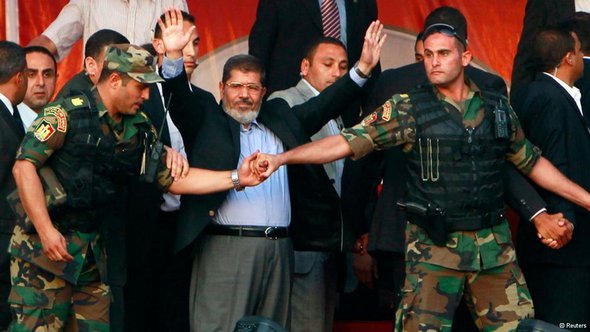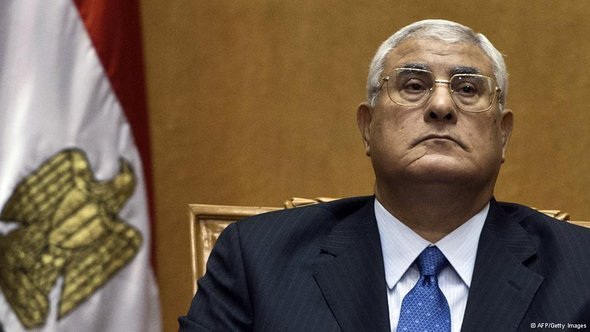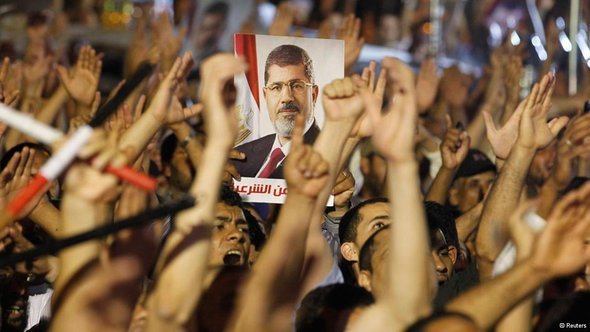Derailing Democracy
A prediction from the initial days of the revolution in early 2011 is currently being confirmed in Egypt. At the time, some voices warned against a new "Islamist dictatorship" that could arise if Hosni Mubarak was toppled. The counter-argument ran that Egyptians would never accept a new form of autocracy and that they would take to the streets and squares in the masses again to protest against it.
This is exactly what the nation is experiencing at present: The Egyptians are fighting against a government that has, in their view, taken on increasingly dictatorial characteristics.
The political failure of the Egyptian President Morsi and his Muslim Brotherhood-dominated government is so all-encompassing that no one should have any sympathy for them. They only have themselves to blame for their predicament. Their governance was so bad that rather than solving any of the nation's most pressing problems, they have only served to make them much worse.
Failed democratic experiment
Egypt is groaning under a dramatic economic crisis, even security has not been restored.

The Muslim Brothers may profess to support democracy in principle – something that is entirely credible – but they have failed to breathe life into this avowal in practice. In the end, democracy is about more than just free elections. First and foremost they have not succeeded in incorporating their opponents into the democratic process, which was a major blunder.
But it would be nevertheless too easy to hold the Muslim Brotherhood solely responsible for the failure of the first attempt at democracy. From the very outset, the process of democratisation was boycotted by institutions still under the influence of the old Mubarak regime. This demonstrates how fatal it was when ousting Mubarak to simply replace the top ranks of the political elite while retaining extensive structures of the old system. There was strong resistance above all from within the judiciary.
And so it came to pass that in June 2012, the Supreme Constitutional Court dissolved the parliament that had been elected in the freest and fairest elections that had ever been conducted in Egypt.
The powers that Morsi awarded himself at the time are somewhat easier to understand when viewed against this backdrop of events. Although this does not excuse "politics by decree", his actions do need to be viewed in context.
Weakness of secular opposition
The liberal and secular opposition has also turned out to be extremely weak since the ousting. As far as organisation and policy programme is concerned, at no point has it managed to position itself as a credible alternative to Islamist forces. Faced with its own weakness it has often elected to withdraw from the process of political negotiation and resort to fundamental opposition – preferring to march out of the meeting room rather than stay seated at the table.

Ultimately, the first attempt at democracy has essentially failed because the various different camps in Egypt never succeeded in overcoming the huge gulf between them, establishing a democratic culture of compromise that includes all sides: the religious-Islamist forces as well as the leftwing, liberal and secular groups.
Morsi's dismissal carries the legitimatisation of the people on a massive scale. The hundreds of thousands, or millions of people who took to the streets to oppose his rule have issued a verdict that should not be ignored. But nevertheless: Morsi and the Muslim Brotherhood were elected to govern in free elections – meaning they also have a mandate from the people. There have also been several large-scale rallies in support of the President over the past few days. One kind of legitimatisation is going head-to-head with another kind of legitimatisation here, and it is very difficult to gauge which side is really in the majority.
Tahrir Square as stage for the coup
The leaders of the Egyptian army opted for Tahrir Square. It would be naïve to believe that the military is concerned with salvaging the nation's democracy. Its primary concern is to secure its own sinecures in the form of an economic empire and its independence from politics.
This was an opportune moment for the military to get its revenge on Morsi, who deprived the Supreme Council of the Armed Forces of just a few too many of its powers last year. The army's actions may be welcomed and even celebrated by broad sections of the Egyptian populace – but it is nevertheless a kind of putsch against a freely elected President. A coup of this nature is difficult to reconcile with democracy.
But much more crucial is the fact that it does not solve the nation's chief problem: the stark polarisation of political forces. The Muslim Brotherhood may have failed politically – but the party remains a robust grouping and represents broad sections of the population. These sections of society are now being sidelined by force, after it all it is highly unlikely that the Brotherhood will now allow itself to be included in any transitional government.
The actions of the army are further exacerbating the gulf between the camps, lessening the chances of political compromise, making Egypt even less governable – and increasing the possibility that the nation might, in a worst case scenario, descend into violence on a massive scale.
Heavy-handed style of governance
The first time it seized power, the military turned out to be unwilling and incapable of leading the nation towards democracy, in fact it ran the country with a heavy hand. At the time, Tahrir Square struck up the slogan "Topple the military leadership" and extracted the generals' retreat.
Now the new rulers promptly interrupted TV broadcasts of pro-Morsi demonstrations, shut down Islamist TV channels and arrested leading members of the Muslim Brotherhood. They are placing the country's political destiny in the hands of the supreme constitutional judge, or in other words the chairman of the institution that dissolved a freely-elected parliament thereby significantly obstructing the process of democratisation. Egypt on the road to more democracy?

The alternative approach in the current phase would have been to continue the demonstrations against Morsi until he agreed to a minimal compromise in the form of new elections. These would, incidentally, have been due sooner or later. Ultimately, elections are the only way for people to bestow authority upon those who govern them.
A boost for radical forces
Who is profiting from the Morsi's fall? In view of the current state of affairs, there is no guarantee that the liberal and secular opposition would perform much better in any possible new elections. It is still fragmented and organisationally in a weak position. If it hopes to put itself up as a credible alternative, it would have to address these shortcomings in record time.
The Muslim Brotherhood has suffered a setback, but as a party strongly anchored within Egyptian society for decades, it will continue to remain a significant force. Which begs the question: What will happen if the party's political arm, the Freedom and Justice Party, wins the next elections contrary to expectations?
Another group set to capitalise from these developments are more radical political forces such as the Salafists, who already captured almost 30 percent of the vote in the first parliamentary poll.
Representatives of the old Mubarak regime will also reorganise themselves and potentially find a considerable degree of approval. As though to say: It wasn't all that bad before, at least there was a certain amount of political stability. Don't forget: The last presidential elections very nearly resulted in a win by a representative of this old guard in the form of Ahmed Shafik.
Joy at the toppling of Morsi may be great and understandable: But for the democratisation of the country, the military intervention could have fatal consequences.
Jan Kuhlmann
© Qantara.de 2013
Translated from the German by Nina Coon
Editor: Lewis Gropp/Qantara.de
